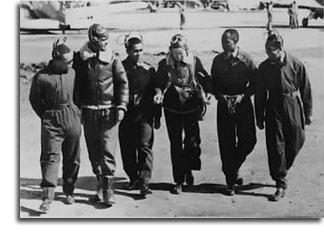
"The 99th Pursuit Squadron" - Courtesy of the Federal Government Archives
A Remarkable Breakthrough
“I come from a generation of African-Americans where we were always trying to be better. We were taught that you had to be better than whites in order to move ahead..."
- Dr. Roscoe Brown, Tuskegee Airmen, 2017
Roosevelt Takes The Leap:
As the war ramped up, President Roosevelt signed Public Law 18, which laid the groundwork for African-Americans who wanted to leave behind the menial tasks previously set upon them by providing advanced training opportunities. Roosevelt had no moral epiphany. It was a simple numbers game that pushed him over the edge: the military needed people to fight the Nazis.
Two years later, Roosevelt created the 99th Pursuit Squad. This all-Black division was trained at Tuskegee Field. These were the first Tuskegee Airmen.

"The 99th Pursuit Squadron" - Courtesy of the Federal Government Archives
From my interview with Professor Daniel Hutchinson
The Initial Breakthrough:
Since Blacks were previously barred from the Air Force, the creation of the Tuskegee Airmen was in of itself a historical breakthrough. It rejected the idea that Black men were incapable of learning the advanced skills required to be a fighter pilot.
An Unscheduled Flight
In an effort to demonstrate the progressiveness of the Roosevelt-Era military, Eleanor Roosevelt, the First Lady, went on a flight with Tuskegee Airmen Chief Anderson, much to the Secret Service's dismay. This action went a long way toward normalizing the existence of Black pilots and her ethos shifted the narrative toward celebrating them.
The Role of Tuskegee in the Fight For Democracy:
The Tuskegee Airmen played an integral part in the world's most global conflict. They primarily partook in fighter escort missions, guarding bombers as they flew to their location. It was a noble and risky task: two traits that would ultimately work in their favor once they returned home.
The Best of the Best:
The Tuskegee Airmen were among the best pilots that the United States had at its disposal. They were shaped by pressure of being the first of their kind--they wanted to prove themselves--and because they were all volunteers. They were so skilled, in fact, that myths developed about the extent of their abilities, including that they never lost a bomber.

"Lawrence E. Dickson (second left), pictured in 1942 with members of the graduating class at Tuskegee Army Flying School."
From my interview with Professor Daniel Hutchinson
The mythos surrounding them and their feats would only multiply their domestic fame and put pressure on the continued existence of segregation, which was rooted in the supposed inferiority of African-Americans.